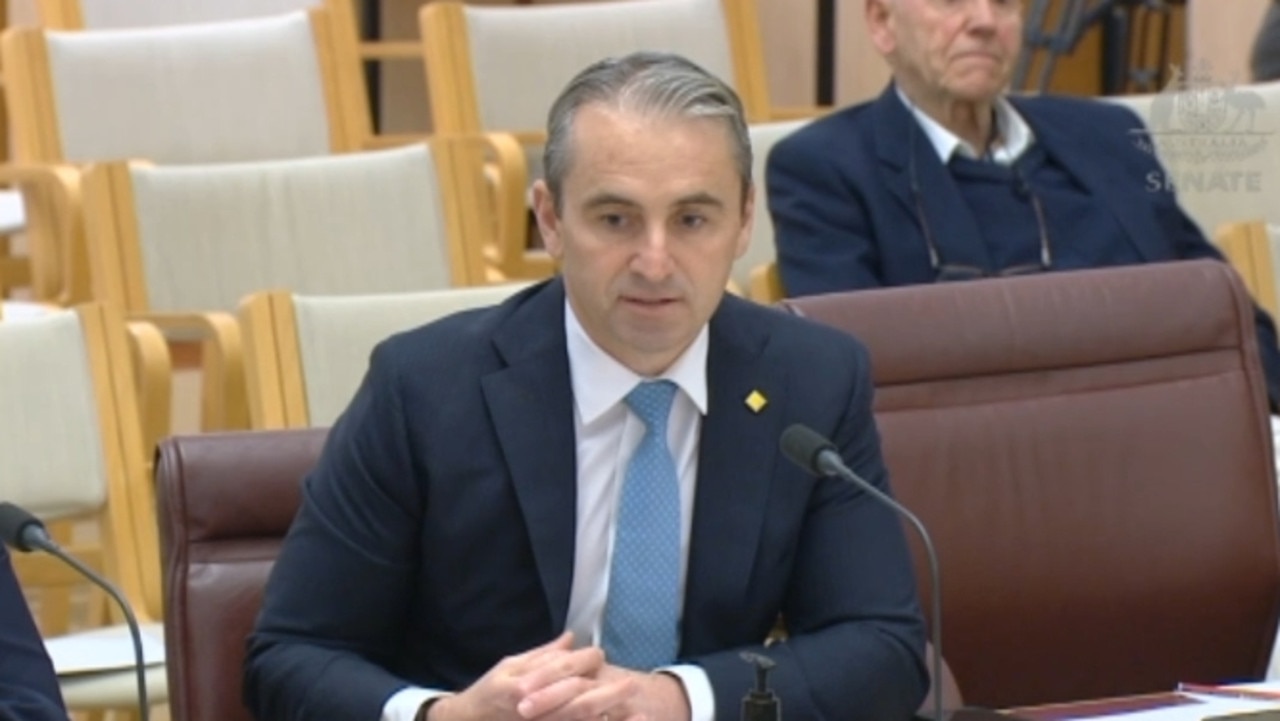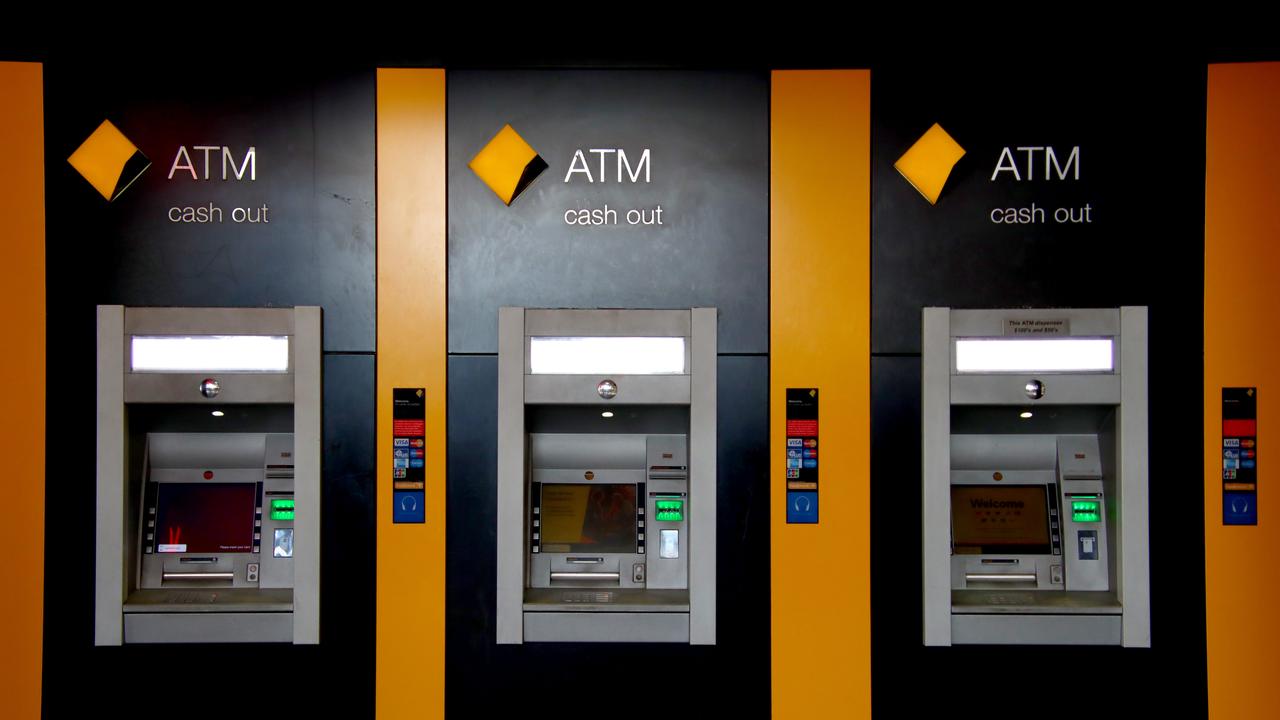Keeping cash costs every customer $40, CommBank boss says
Keeping cash costs every customer around $40 per year even though many no longer use physical currency, CommBank’s chief executive says.
Keeping cash costs every customer around $40 per year even though many no longer use physical currency, CommBank’s chief executive says.
Appearing before a Senate inquiry into regional bank closures at Parliament House in Canberra on Wednesday, Matt Comyn joined the CEOs of ANZ, NAB and Westpac for a grilling amid accusations they are abandoning country Australia.
The discussion on branch closures tied into the ongoing debate about Australia‘s move to cashless society, with Mr Comyn arguing the cost of running CommBank’s 728 branches — $1 billion a year — to sell loans and manage cash transactions was becoming increasingly unsustainable as customer demand diminished.
“Transporting and making cash available around our vast country involves the considerable expense of logistics and security,” Mr Comyn told the hearing.
“We estimate that continuing to support distribution and availability of cash costs CBA approximately $400 million each year — which works out to roughly $40 for every one of our 10 million customers. Many of our customers don’t use cash though — and these customers cross-subsidise those that do.”

Cash transactions have plummeted across the CommBank network in recent years.
“Five years ago, 43 per cent of all point of sale transactions were cash,” he said.
“Today the figure is around 15 per cent. And yet every week customers transact more than $18 billion through the CommBank app — an increase of 64 per cent in just two years.”
But Mr Comyn stressed there were no plans to ditch cash altogether, unlike Macquarie Bank.
“We certainly have no plans to remove cash distribution or the provision of cash in Australia,” he said. ”I don‘t think that that’s feasible, and I don’t think that would be desirable, certainly in the foreseeable future.”
The other bank bosses also gave evidence about the dominance of digital transactions for their banks — Westpac CEO Peter King said 96 per cent of customer transactions were now digital, while that figure was 93 per cent for NAB, according to CEO Ross McEwan.
ANZ CEO Shayne Elliot said more than 90 per cent of the bank’s customers aged over 65 “use at least one self-service option to do their banking, such as our ANZ app, internet banking or ATMs”.
“While most customers prefer digital channels for many of their transactions, branches continue to be important,” Mr Elliot said.

Last week, Macquarie Bank announced it would be phasing out cash altogether next year, following similar moves by CommBank, NAB and ANZ to stop handling cash in a few branches.
“I’d say we’ll be functionally cashless by the end of 2025 — it’ll just be a complete rarity,” Richard Holden, professor of economics at UNSW Business School told news.com.au.
“But unless the government gets involved to accelerate the process I think we’ll be actually cashless by 2030.”
Finance expert Sarah Wells has warned Australia’s banks could soon start “cash rationing” at ATMs due to the lower demand for banknotes.
Prof Holden argued there were very few genuine use cases for cash “other than illicit acts or people who want to use cash to hide things from people”.
He rejected the libertarian position that people have a right to use physical currency free from government snooping, arguing there was a “real cost” to cash that everyone had to pay for.
“Take a local cafe — if they’re taking bundles of cash they’ve got to have insurance for that, got to create a float in the morning, bundle it up at the end of the day, put it in a night safe,” he said.
“That all costs money, and it adds to the price or your sandwich or coffee. People don’t have a right to something that everyone else has to pay for. People have a right to healthcare, education, but people don’t have a right to a means of payment when there’s a perfectly viable alternative.”

In response to the Senate inquiry, CommBank paused all regional bank closures until the end of 2026.
“As time goes on, it becomes unsustainable to invest substantial resources keeping expensive services that fewer and fewer customers use,” Mr Comyn said.
Mr Comyn also issued a plea for rural and regional customers to bank with CBA if they valued the service in their local communities.
“Our decision to pause rural bank closures is predicated on customers and communities valuing our decision to stay,” Mr Comyn said.
“So for other local councils, small businesses, farmers, homeowners and regional areas, if you value CBA supporting your communities, we will be delighted to serve you.”
According to estimates from the Financial Sector Union, in the five years to June 2022 more than 1600 bank branches were closed across Australia, with a disproportionate number located in regional and rural Australia.
Without government intervention, it appears that this trend will continue as customer demand switches to online banking.
The big four banks have previously argued that online banking and their service offering through Australia Post are adequate replacements for the closure of bricks and mortar branches.
The inquiry has previously heard from community leaders, small businesses and councils in regional rural areas.
Witnesses have told the inquiry that regional banking is crucial for small business and community organisation operations.
— with NCA NewsWire






